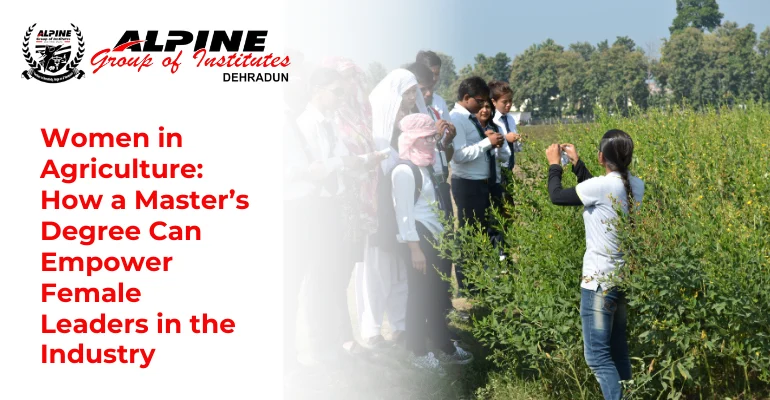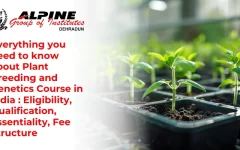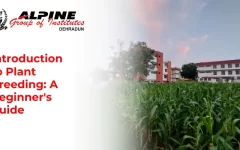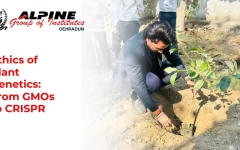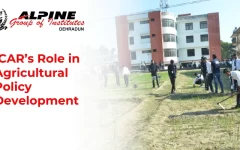Women in Agriculture: How a Master’s Degree Can Empower Female Leaders in the Industry
2024-12-16 10:27Women in Agriculture: How a Master’s Degree Can Empower Female Leaders in the Industry
Agriculture is often viewed as a male-dominated field, but this perception is slowly changing as more women are stepping into leadership roles in farming, agribusiness, research, and policy. Women are not only contributing to the agricultural industry but are also driving its transformation toward greater sustainability, innovation, and inclusivity. One of the most powerful ways for women to gain the skills, knowledge, and confidence to lead in agriculture is through advanced education specifically, a Master’s in Agriculture. This advanced degree not only equips women with critical skills but also provides the knowledge and confidence to lead, innovate, and challenge the status quo in a traditionally male-dominated field.
Breaking Barriers and Closing the Gender Gap
Agriculture has historically been dominated by men, particularly in leadership roles such as farm management, agribusiness, and policy-making. Women have always been involved in agricultural work especially in smallholder farming systems yet their contributions have often been undervalued or overlooked.
A Master’s in Agriculture can play a pivotal role in closing the gender gap by equipping women with the education and credentials needed to take on higher-level roles in farming and agribusiness. Advanced degrees provide women with the technical expertise and leadership skills required to challenge long-standing norms, break through glass ceilings, and gain recognition as authorities in their field.
In regions where women have limited access to formal education or land ownership, a master’s degree in agriculture can empower them to advocate for equal access to resources and rights, leading to greater gender equity within the sector. It enables women to navigate the challenges that come with the patriarchal structure of agriculture and positions them as key decision-makers in agricultural practices, policy, and development.
Developing Critical Leadership and Management Skills
A Master’s in Agriculture doesn’t just teach agricultural science or farming techniques, it also prepares women to become leaders and managers in the agricultural sector. From understanding business strategies and financial management to honing skills in negotiation and policy-making, graduate programs offer a comprehensive curriculum designed to develop leadership abilities.
Women with a master’s degree in agriculture can go on to manage large-scale farms, agribusinesses, or non-governmental organizations focused on rural development and food security. They are better equipped to handle the multifaceted challenges of running a farm or business, such as resource management, supply chain optimization, and workforce leadership.
In addition to technical training, master’s programs often emphasize critical thinking, problem-solving, and strategic planning. These leadership skills are essential for women who aspire to influence agricultural policy, implement new technologies, or manage complex international development projects.
Fostering Innovation and Sustainability
Today’s agricultural industry faces numerous challenges, from climate change and soil degradation to the need for sustainable food production systems. As these challenges intensify, there is a growing demand for innovative solutions that can drive agricultural transformation.
A Master’s in Agriculture prepares women to be at the forefront of this innovation. Graduate programs often offer specialization tracks in areas like agroecology, sustainable agriculture, agri-tech, and food security, providing women with the knowledge to develop cutting-edge solutions to pressing agricultural issues. Women with advanced degrees are also well-positioned to lead research teams and collaborate on projects that develop sustainable farming practices, improve crop yields, and introduce eco-friendly technologies.
For example, women can play a critical role in advancing the adoption of precision agriculture (using data analytics and smart technologies to optimize farming) or regenerative farming practices (which restore and enhance soil health). They can also contribute to developing policies and technologies that mitigate climate change and promote biodiversity.
Building Networks and Mentorship Opportunities
One of the most powerful aspects of pursuing a Master’s in Agriculture is the opportunity to build a robust professional network of peers, mentors, and industry experts. Women in agriculture often face unique challenges related to gender, from being underrepresented in decision-making bodies to battling stereotypes about women’s roles in farming. A graduate program provides a supportive environment to form relationships with like-minded individuals and potential mentors.
Mentorship is particularly crucial for women entering leadership positions. Having access to experienced professionals whether they are professors, industry leaders, or alumni, can provide invaluable guidance and career advice. Graduate programs also offer networking events, internships, and connections to influential organizations, all of which help women expand their professional circle and gain visibility in the industry.
Diverse Career Paths and Entrepreneurship Opportunities
A Master’s in Agriculture opens up a world of career possibilities beyond traditional farm management. While some women may choose to manage farms or work in rural development, others may become leaders in agribusinesses, policy organizations, or agricultural research institutions. The agricultural sector offers a wide array of roles in fields such as:
Agricultural Research and Development:
Women can lead research initiatives in crop genetics, pest management, and agricultural biotechnology.
Agribusiness:
Many women with a master’s in agriculture go on to manage or run businesses related to farm input supply, food processing, or distribution.
Agricultural Policy and Advocacy:
With expertise in agricultural systems and economics, women can influence policy decisions, advocate for sustainable agricultural practices, or work with government agencies and NGOs.
Agri-tech Innovation:
Women with an interest in technology can become pioneers in the rapidly growing agri-tech sector, developing solutions such as farm management software, robotics, or biotechnology to increase food production.
Moreover, the knowledge gained from a Master’s in Agriculture provides women with the tools to become entrepreneurs. Whether they’re interested in starting their own farm, food product company, or sustainable farming consultancy, graduate education equips women with the skills to build and manage successful businesses from the ground up.
Inspiring Future Generations of Female Agricultural Leaders
Women who complete a Master’s in Agriculture not only empower themselves but also serve as role models for future generations. As more women enter leadership positions in agriculture, they inspire younger women to follow in their footsteps, creating a ripple effect of female empowerment across the industry. These women can mentor the next generation, share their knowledge and experiences, and encourage young girls to pursue agricultural careers, whether in the field, in the lab, or in boardrooms. By inspiring the next wave of female agricultural leaders, women with advanced degrees help to reshape the agricultural sector into a more inclusive, innovative, and sustainable industry.
Conclusion: Empowering Women to Shape the Future of Agriculture
A Master’s in Agriculture is more than just an academic achievement, it is a powerful tool that can transform women’s careers and allow them to take on leadership roles in the agricultural industry. From breaking gender barriers to fostering innovation, developing leadership skills, and influencing global food systems, a master’s degree empowers women to become transformative leaders in agriculture.
As we face global challenges such as climate change, food security, and rural development, women with advanced agricultural education are uniquely positioned to drive meaningful change. By supporting women’s education and leadership in agriculture, we are not only helping them succeed but also ensuring a more equitable and sustainable future for the entire agricultural sector. The time has come for women to lead, innovate, and thrive in agriculture, empowered by education and ready to shape the future of food production for generations to come.


